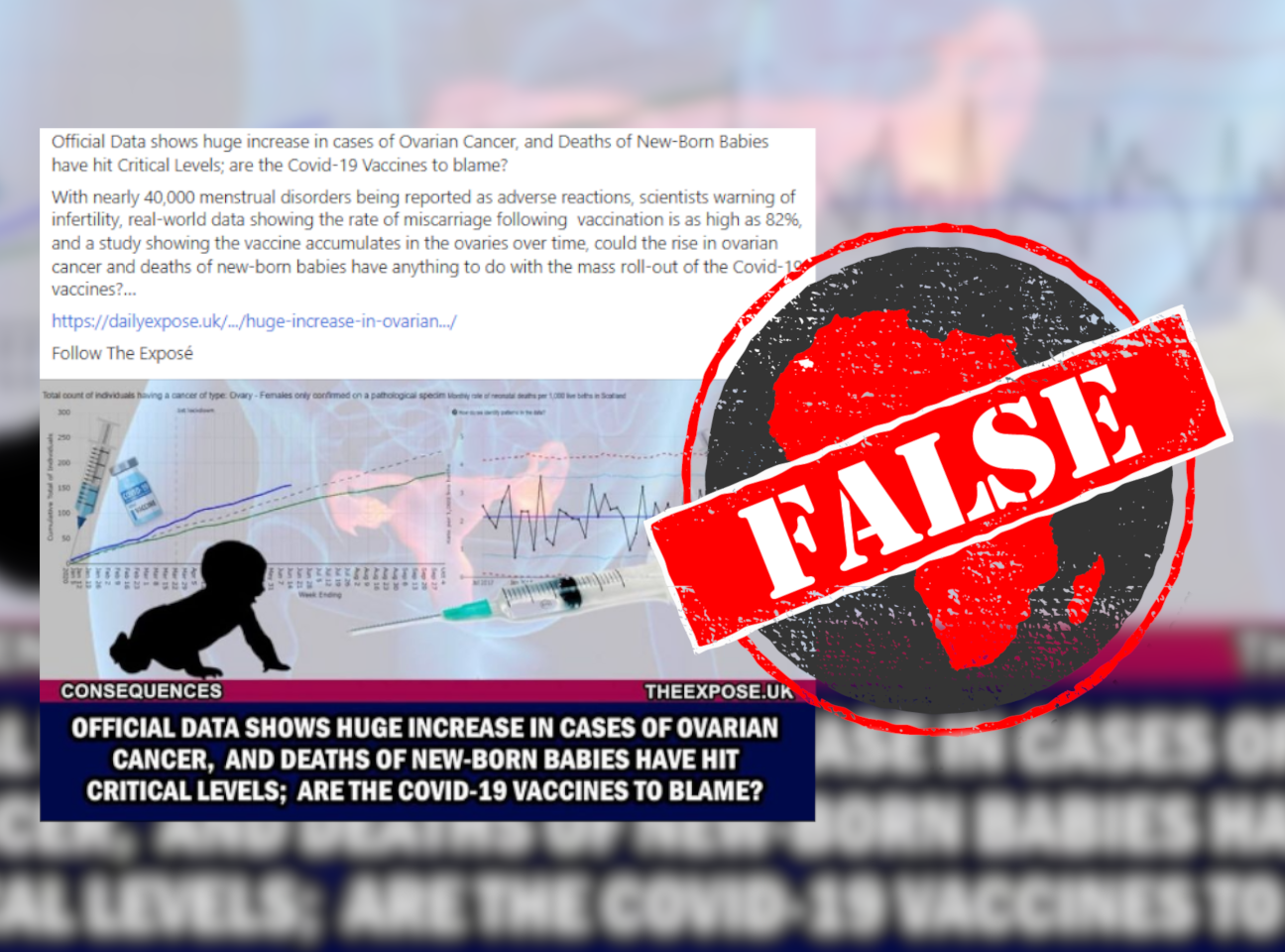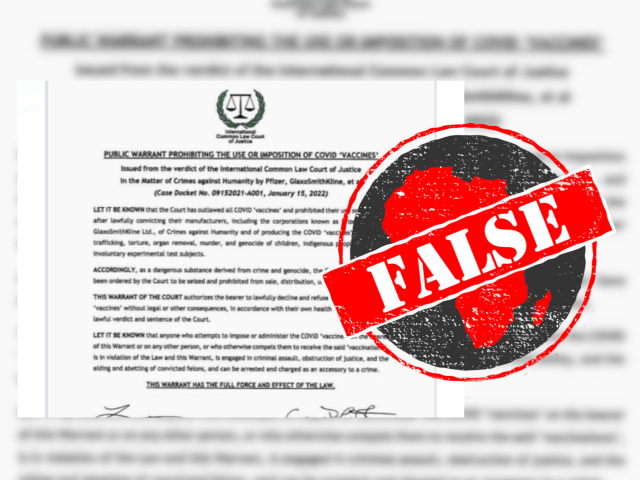“Official Data shows huge increase in cases of ovarian cancer, and deaths of new-born babies have hit critical levels,” reads a graphic posted on Facebook in South Africa. “Are the Covid-19 vaccines to blame?”
The graphic includes a link to The Exposé, a conspiracy website Africa Check and others have debunked before. Here we found an article with the same headline as the graphic. The comment on the graphic quotes from the article.
“With nearly 40,000 menstrual disorders being reported as adverse reactions,” the lengthy quote reads, “scientists warning of infertility, real-world data showing the rate of miscarriage following vaccination is as high as 82%, and a study showing the vaccine accumulates in the ovaries over time, could the rise in ovarian cancer and deaths of new-born babies have anything to do with the mass roll-out of the Covid-19 vaccines?”
The article has been posted by other Facebook users.
Do Covid vaccines cause ovarian cancer, infertility, miscarriage and the deaths of newborns?

‘Ovaries don't play a part in any of the processes’ of vaccination
Ovarian cancer occurs when abnormal cells begin to multiply uncontrollably in the ovary, says Cancer Research UK, an independent organisation. There are different types of ovarian cancer, depending on the type of cell the cancer starts in.
But can Covid-19 vaccines cause ovarian cancer?
Africa Check has previously debunked claims that messenger RNA (mRNA) Covid vaccines – Pfizer-BioNTech and Moderna vaccines – alter human DNA. But the vaccines can’t do this, so they can’t cause cancer, according to the Memorial Sloan Kettering Cancer Center, a cancer treatment and research institution in the US.
MRNA vaccines are not the same as our DNA and can’t combine with it to change our genetic code.
And there is “no truth to the myth that somehow the mRNA vaccine could inactivate the genes that suppress tumours”, Memorial Sloan Kettering Cancer Center says.
Stephen Korsman, a medical virologist at South Africa’s University of Cape Town and the National Health Laboratory Service, told Africa Check that no human genes are altered by Covid-19 vaccines.
“The mRNA breaks down quickly, and then the person is immune, not a mutant, and their ovaries don't play a part in any of the processes.”
He said no safety studies have shown that Covid-19 vaccines cause ovarian cancer. Korsman added that there was no evidence of accumulation in the ovaries due to the vaccine, as said in the claim.
The vaccine has been proven to be safe for pregnant people.
The myth that vaccines aren’t safe for pregnancies could have come from when they were still undergoing clinical trials back in 2020, says Gavi, a global health partnership with the goal of increasing access to immunisation in poor countries.
Gavi explains that pregnant people are often excluded in these first trials, as is standard practice with new treatments or vaccines.
“Generally pregnant women are advised to avoid unknowns during pregnancy, which includes a lot of medication,” Korsman told Africa Check. In most cases, this is just to be safe.
“Vaccines, more than any other medication, have very stringent safety regulations, because they are given to healthy people.”
‘The supposed attack on fertility is a common theme’
It is recommended that people who are trying to get pregnant or might become pregnant in the near future should still get their Covid-19 vaccine, says the Mayo Clinic, a nonprofit academic medical centre in the US.
It explains that there is no evidence that Covid-19 vaccines cause fertility problems in either men or women.
“People can rest assured that these vaccines in no way interfere with fertility,” says the World Health Organization (WHO).
Covid-19 vaccines stimulate both antibody response and a cell mediated immune response against the spike protein of the virus, the WHO explains. This means the vaccines do not interfere with the functions of the reproductive organs of men and women.
“The supposed attack on fertility is a common theme I’ve seen among some conspiracy theorists,” Korsman told Africa Check.
He said the tetanus vaccine has particularly been targeted in this way, mainly in rural African communities. “It’s easy to prey on the vulnerabilities of a pregnant woman – and anyone hoping to have a child – by telling them the vaccines are designed to make people sterile.”
Korsman explained that some vaccines are live organisms, a weaker form of the germ of the disease, which are not generally advised for pregnant people. But mRNA Covid-19 vaccines do not fall into the category of live attenuated vaccines.
No evidence of miscarriage caused by vaccines
What about Covid-19 vaccine and miscarriage claims?
Korsman told Africa Check that “studies of miscarriage haven’t highlighted the Covid vaccine (or any other) as a risk factor”.
According to John Hopkins University, published studies have found that there has been no increase in the risk of first trimester pregnancy loss for patients who have received any of the Covid-19 vaccines (including Pfizer, Moderna and Johnson & Johnson’s Janssen).
One of the studies, published in the New England Journal of Medicine, says it found no evidence of increased pregnancy loss after participants were vaccinated.
Because pregnancy already suppresses the immune system, says Mayo Clinic, pregnant women are more likely to get more sick from the coronavirus and if the mother does not get enough oxygen due to the virus, neither will her baby.
“Sadly, many mothers and babies have died from complications of Covid-19,” says Mayo Clinic, often a result of lack of vaccination.
Covid-19 vaccines and deaths of newborn babies?
The WHO explains that it is important for pregnant people to get vaccinated – not only for the mother’s health, but for the foetus too.
This is because it will protect the mother and unborn baby from severe illness from Covid-19 as well as help mothers build the antibodies that would protect their babies, says Mayo Clinic.
“Research shows that infants born to mothers who receive two doses of an mRNA Covid-19 vaccine might have a lower risk of hospitalisation due to Covid-19 infection in their first six months of life.”
There have also been no safety studies that show harm to foetus or newborn babies, Korsman told Africa Check.
Because some think vaccines can alter human genes, they might think that the mRNA vaccines target the ovaries as part of their alleged “gene therapy”, says Korsman. But this is simply not true.
Republish our content for free
For publishers: what to do if your post is rated false
A fact-checker has rated your Facebook or Instagram post as “false”, “altered”, “partly false” or “missing context”. This could have serious consequences. What do you do?
Click on our guide for the steps you should follow.
Publishers guideAfrica Check teams up with Facebook
Africa Check is a partner in Meta's third-party fact-checking programme to help stop the spread of false information on social media.
The content we rate as “false” will be downgraded on Facebook and Instagram. This means fewer people will see it.
You can also help identify false information on Facebook. This guide explains how.





Add new comment